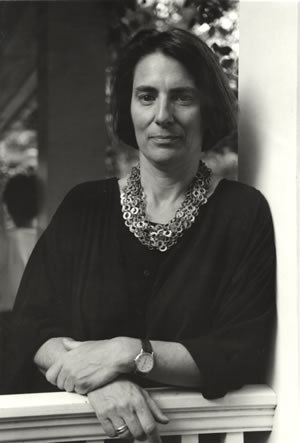Tina Johnstone
In 1980, Tina Johnstone, her husband, David, and their 2 year-old daughter, Zoë, accompanied friends in Dallas to protest gun violence against children. Arriving at Dealy Plaza, the site of John Kennedy’s assassination, they were greeted by piles of posters and boxes of candles for the evening candlelight march. “There were press everywhere, but only the five of us and a few organizers showed up for the rally. We just stood there amidst all the candles and posters.” Twelve years later, Tina and her family became victims of gun violence and Tina became an outspoken advocate for gun control.
Tina was born Katina Mantis, the youngest of four children, to Greek parents in Minneapolis, Minnesota. After attending Pierce College in Athens, Greece for a year, she finished her degree in studio arts and philosophy at the University of Minnesota in 1972 and took a job as a head cook at the faculty club. At work, after she and the other women were verbally abused and denied health insurance, Tina helped to unionize the club. Two years later, she married David Johnstone, a Ph.D philosophy student, and together they settled in Lawrence, Kansas. They had two children: Zoë, born in 1979, and Ian, in 1982, and eventually moved to Staten Island.
In 1992, during a business trip to San Francisco, David was shot by a 16 year-old boy high on liquor and cocaine and was paralyzed from the waist down. A month later, a blood clot in David’s leg unexpectedly broke free and traveled to his lung, killing him.
Years later, his daughter, Zoë would write: “My father will not meet the new people in my life, he has never heard me play guitar. I have grown up without him. There is nothing I would not give just to see or talk to him for a second.”
In 1993, as a 41-year-old widow and a suddenly single mother, Tina turned to address the toll exacted by the epidemic of gun violence in America. She co-founded New Yorkers Against Gun Violence (NYAGV), and organized the first Silent March, which has become an biennial protest against gun violence. “When I first started educating myself about gun control, I felt as if the public didn’t know anything about guns,” Tina recalls. “It was OUTRAGEOUS. Being outspoken has made me available, my anger doesn’t wane, but my patience does because gunshot stories share one thing: they are horrifying.” NYAGV has publicly criticized New York Senator Alfonse D’Amato’s vote against the Brady Bill. In 1994, NYAGV joined other groups in the successful campaign for a partial federal ban on assault weapons. During that same year, Tina helped convince former Representative Susan Molinari to reverse her opposition to a federal ban on assault weapons.
Tina spends uncounted hours on the phone, listening to the stories of other victims’ families, recruiting them to participate, and educating them about current gun policy. At the 1996 Silent March on Washington, nearly 40,000 pairs of shoes—representing the number of Americans killed by guns that year—were sorted into 50 neat displays representing each of the fifty states. Tina, Zoë, and Ian included the pair of sneakers David wore during his rehabilitation among those of 2,444 New Yorkers killed in one year. The 1998 Silent March was held in May on the doorstep of Smith & Wesson in Springfield, Massachusetts. Smaller demonstrations took place at other firearms manufacturing plants in Virginia, Maryland, Miami, and Connecticut.
Tina is one of 16 co-plaintiffs—all New York State gunshot victims or family members of victims—in a law suit against 35 gun manufacturers and 30 firearms distributors. The lawsuit contends that, in Tina’s words, “these people are negligent because they saturate the country with handguns, yet don’t do enough to keep their products from falling into the hands of criminals or children.”
Tina Johnstone often feels isolated and drained by her work. “I want more help. I can’t do this alone. I want to find the me in every congressional district so everyone can talk. I’ve committed my life to working to prevent gun death and injury, so that other families might be spared the pain my children and I have endured.”
 Photo by Dorothea von Haeften
Photo by Dorothea von Haeften